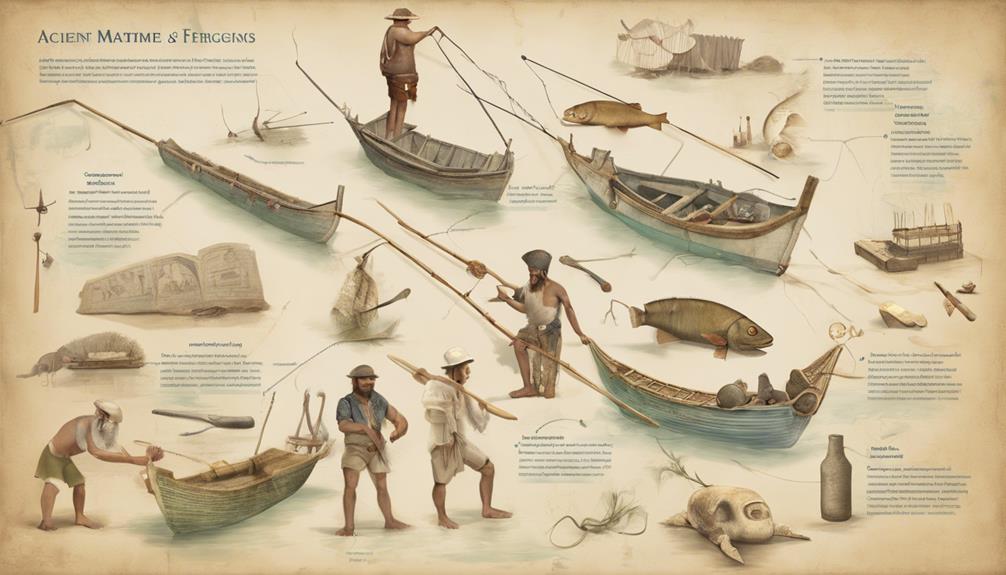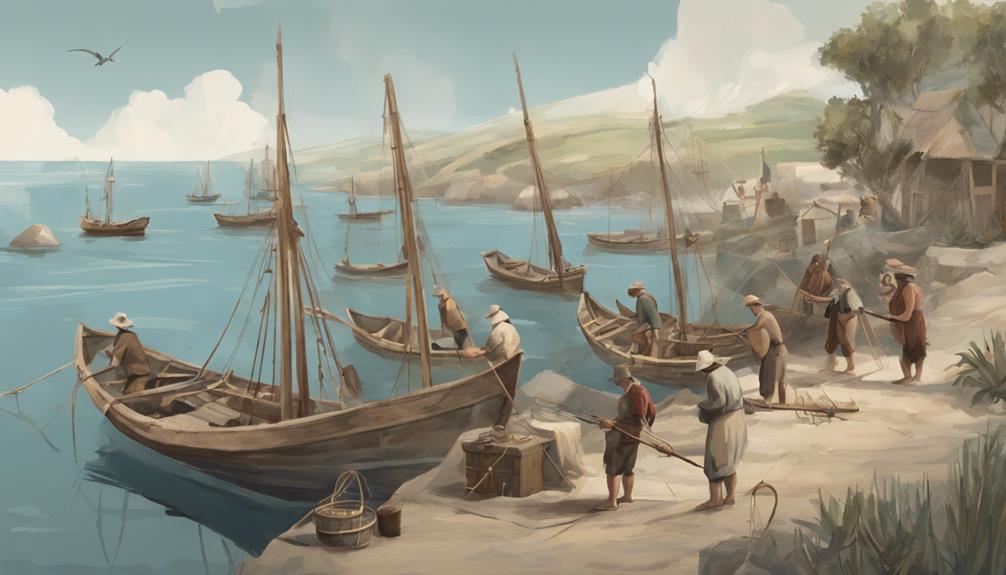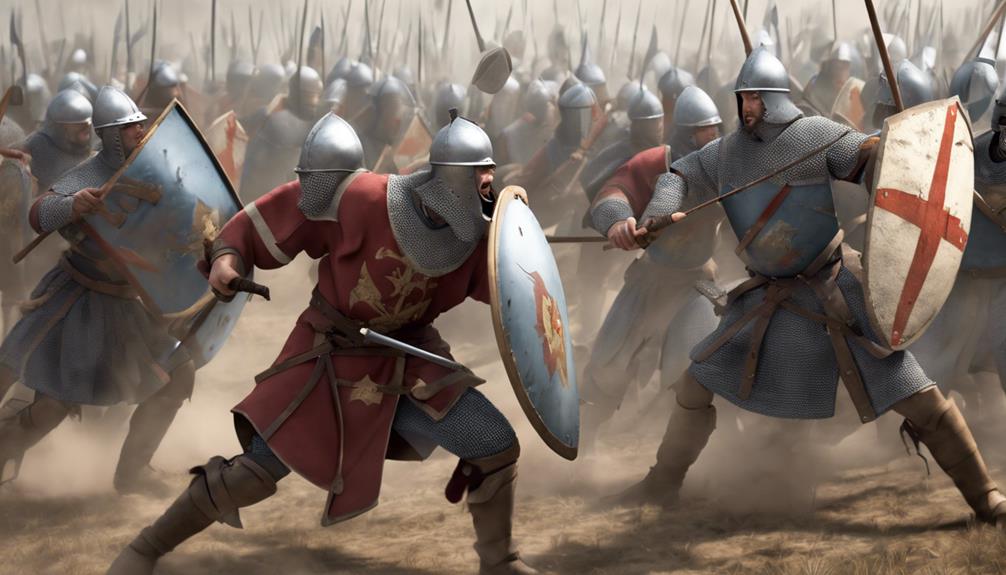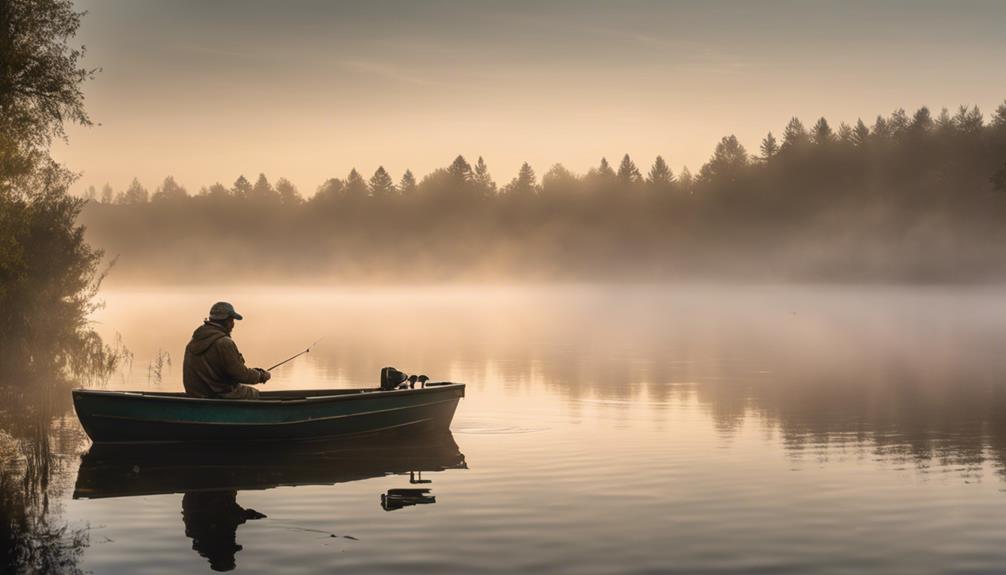Ancient maritime communities thrived through diverse angling techniques. Crafted hooks from bone, shell, and wood boosted efficiency. Natural bait attracted plentiful fish. Handlines, spears, and nets were common tools. Plant fibers and animal tendons improved casting. Fishing was vital for food, economy, and culture. Angling shaped trade networks and fostered unity. Rituals honored nature and traditions. Sustainable practices promoted marine conservation. Evolution led to diverse customs worldwide. Educational efforts enhanced skills and bonds. Explore how angling traditions unveil a deep connection between ancient societies and the sea, showcasing a dynamic tapestry of heritage and interactions.
Early Methods of Angling in History
Exploring the origins of angling reveals a diverse range of early methods utilized by ancient maritime communities for fishing. Ancient innovations in angling were crucial for these communities to sustain themselves through fishing. One such innovation was the use of handmade fishing hooks crafted from materials like bone, shell, or wood. These early hooks were ingeniously designed to catch fish effectively, showcasing the resourcefulness of ancient fishermen.
Historical traditions also played a significant role in shaping early methods of angling. In many maritime communities, fishing wasn't just a means of sustenance but also a cultural practice passed down through generations. Rituals and ceremonies often surrounded fishing expeditions, highlighting the spiritual connection these communities had with the sea and its resources. These traditions influenced the techniques and tools used for angling, with methods varying from region to region based on local customs and beliefs.
Moreover, ancient maritime communities developed sophisticated ways to attract fish, such as using bait made from natural materials like insects, small fish, or plant matter. By studying the historical evolution of angling, researchers can gain valuable insights into the ingenuity and adaptability of early fishermen. The blend of ancient innovations and historical traditions in angling not only provided sustenance but also enriched the cultural fabric of maritime communities.
Tools and Techniques Used for Angling
Utilizing a variety of specialized tools and techniques is essential for successful angling in both ancient maritime communities and modern fishing practices. In ancient maritime communities, primitive techniques such as handlines, spears, and nets were commonly used for angling. Handlines, made of natural fibers or leather cords, allowed fishermen to catch fish by hand, providing a simple yet effective method of angling. Spears were also used for fishing in shallow waters, enabling fishermen to target specific fish with precision. Nets, crafted from woven plant fibers or animal sinew, were another crucial tool for capturing larger quantities of fish at once.
Innovative tools have also played a significant role in the evolution of angling techniques. Ancient maritime communities began developing more sophisticated tools like hooks made from bones, shells, or even wood, which revolutionized the efficiency of angling. These early hooks allowed fishermen to target larger fish and expand their catch. Additionally, the invention of lines made from plant fibers or animal tendons enabled fishermen to cast their hooks further into the water, reaching deeper depths and increasing their chances of a successful catch.
Importance of Angling in Ancient Societies
Angling held a crucial role in sustaining ancient societies, providing a reliable food source and contributing to economic stability and cultural practices. In ancient maritime communities, angling traditions were deeply ingrained in daily life, with fishing activities being essential for survival. The practice of angling not only ensured a steady supply of food but also played a significant role in community bonding.
Angling was more than just a means of acquiring sustenance; it was a cultural practice that brought people together. Fishing expeditions were often communal activities where individuals would work together to catch fish, fostering a sense of unity among community members. These shared experiences created strong social bonds and promoted cooperation within the community.
Furthermore, angling traditions were passed down through generations, forming an integral part of the cultural heritage of ancient societies. The knowledge and skills associated with fishing were cherished and preserved, highlighting the importance of angling in maintaining cultural identity.
Role of Angling in Trade and Economy
Throughout ancient times, the practice of angling played a pivotal role in shaping the trade networks and economies of maritime communities. Angling not only provided a vital food source but also contributed significantly to the economic exchange and development of trade routes among these ancient civilizations.
Trade routes were often established and expanded based on the availability of fish through angling. Fish caught through this method weren't only consumed locally but also traded with neighboring communities, creating interdependencies and fostering economic growth. The abundance of fish in certain regions due to angling practices led to the development of specialized trade networks centered around these valuable marine resources.
Angling played a crucial role in facilitating economic exchange within maritime communities. The surplus of fish caught through angling could be preserved, dried, or smoked, extending its shelf life and enabling it to be traded over long distances. This trade of fish not only provided communities with access to a diverse range of food sources but also allowed them to acquire other goods through barter or monetary exchange, thus stimulating economic activity and promoting social development.
Cultural Significance of Angling Practices
The economic importance of angling in ancient maritime communities paved the way for a deeper exploration of the cultural significance embedded within these fishing practices. Angling went beyond a mere means of sustenance; it held profound spiritual connections for these communities. Fishing wasn't just a task but a ritual that symbolized harmony with nature and the divine. The act of angling was often intertwined with religious beliefs, with fish being seen as sacred beings in many cultures.
Moreover, angling played a crucial role in the social fabric of ancient maritime communities. Fishing trips weren't just about catching fish; they were occasions for bonding, storytelling, and passing down traditions. Communities would gather by the shores, sharing knowledge and experiences while partaking in the art of angling. These gatherings weren't only about the catch but about the camaraderie and sense of belonging they fostered.
Angling practices were deeply ingrained in the cultural identity of these communities, shaping their values and customs. The intricate rituals surrounding fishing expeditions served as a way to honor the sea and its offerings, reinforcing the connection between humans and the marine environment. Through spiritual connections and social rituals, angling became more than a livelihood; it became a cornerstone of ancient maritime culture.
Sustainability Practices in Ancient Angling
Sustainable fishing practices were meticulously observed and implemented by ancient maritime communities to ensure the long-term abundance of marine resources. Ecological conservation was a fundamental concept in the ancient angling practices of these communities. They understood the delicate balance of the marine ecosystem and the importance of preserving it for future generations. Resource management was a key aspect of their sustainability practices, with strict regulations on the size and quantity of fish that could be caught.
Ancient anglers employed various techniques to minimize their impact on marine populations. One common practice was using selective fishing methods, targeting specific species while allowing others to thrive. Additionally, they adhered to seasonal fishing patterns to avoid overexploitation during sensitive times such as breeding seasons. These practices not only helped maintain fish stocks but also contributed to the overall health of the marine environment.
Furthermore, ancient maritime communities practiced habitat conservation to support marine biodiversity. They recognized the interconnectedness of different species and the reliance of fish on healthy ecosystems. By protecting crucial habitats such as coral reefs, mangroves, and seagrass beds, they ensured the sustainability of their fishing grounds for years to come.
Evolution of Angling Customs Over Time

Over time, angling customs have undergone significant transformations reflecting changes in societal values and technological advancements. As fishing traditions evolved, so did the techniques and customs associated with angling. The evolution of angling customs over time can be analyzed through various lenses:
- Technological Advancements: The development of new tools and equipment, such as modern fishing rods, reels, and sonar technology, has revolutionized angling techniques.
- Cultural Influences: Different cultures have shaped angling customs, leading to diverse practices worldwide, from fly fishing in Europe to handline fishing in Asia.
- Environmental Awareness: Growing concerns about overfishing and habitat destruction have led to the adoption of more sustainable angling practices.
- Social Norms: Changing societal values have influenced angling customs, with catch-and-release becoming more widespread to promote conservation.
- Educational Initiatives: Increased knowledge-sharing through angling clubs, workshops, and online resources has enhanced angling techniques and promoted a sense of community among anglers.
These factors have contributed to a dynamic evolution of angling customs, highlighting the intricate relationship between fishing traditions, technological innovations, and societal values. By understanding the historical context and contemporary developments in angling customs, we can gain insights into the complex interplay between human activities and marine ecosystems.
Impact of Angling on Maritime Communities
Exploring the ramifications of angling practices on maritime communities reveals a complex interconnection between fishing activities and societal dynamics. Angling traditions have played a significant role in shaping the identity and cohesion of maritime communities throughout history. By engaging in angling, community members not only secure a vital food source but also establish a shared cultural practice that strengthens bonds among individuals. The act of fishing together fosters a sense of unity and cooperation, creating a social fabric that transcends generations.
Community bonding through angling is evident in various aspects of maritime life. Shared fishing expeditions not only provide sustenance but also serve as opportunities for storytelling, skill-sharing, and the passing down of knowledge from experienced anglers to younger generations. This transfer of wisdom not only ensures the preservation of angling techniques but also reinforces the sense of belonging within the community.
Moreover, angling traditions often incorporate rituals and ceremonies that further enhance the communal ties among maritime inhabitants. From preparing fishing gear to celebrating successful catches, these rituals contribute to the collective identity of the community and instill a sense of pride in their maritime heritage. In this way, angling goes beyond a mere economic activity; it becomes a cornerstone of social life, promoting unity, cooperation, and a shared sense of belonging among maritime communities.
Frequently Asked Questions
How Did Ancient Maritime Communities Store and Preserve Their Catch?
When ancient maritime communities stored and preserved their catch, they utilized various preservation methods and storage techniques. These practices were crucial for ensuring a sustainable food supply.
Fish were often salted, smoked, dried, or pickled to prolong their freshness. By preserving their catch, these communities could stockpile food for times of scarcity.
Additionally, different culinary traditions and food preparation techniques evolved around these preserved fish, showcasing the resourcefulness and ingenuity of ancient maritime societies.
Were There Any Specific Rituals or Ceremonies Associated With Angling in Ancient Societies?
In ancient societies, fishing wasn't just about catching food; it held a deeper significance. Religious ceremonies often intertwined with fishing traditions, emphasizing spiritual connections to the sea. Fishing rituals were performed to appease deities or seek blessings for a plentiful catch.
These ceremonies helped foster a sense of community and reinforced the importance of sustainability and respect for the marine environment. Such rituals played a crucial role in the cultural fabric of ancient maritime communities.
What Were the Social Dynamics and Hierarchies Involved in Angling Communities?
When looking at the social dynamics of angling communities, it becomes evident that hierarchies were often influenced by factors such as fishing expertise, access to resources, and knowledge of fishing techniques.
Social structures within these communities were shaped by the division of labor, with individuals specializing in different aspects of angling based on skill level.
This specialization often led to the formation of hierarchies where those with advanced fishing knowledge held positions of authority and respect.
Did Ancient Maritime Communities Have Any Superstitions or Beliefs Related to Angling?
Ancient maritime communities held deep-rooted beliefs and superstitions surrounding angling. These traditions were intertwined with their customs and played a significant role in shaping their daily lives.
Fishermen often adhered to rituals and practices before setting out to sea, influenced by a blend of spiritual and practical considerations. Understanding these superstitions provides valuable insights into the cultural fabric of these ancient societies.
How Did Environmental Changes Affect the Angling Practices of Ancient Civilizations?
Environmental changes had a significant impact on the angling practices of ancient civilizations. As the climate shifted or fish populations moved, communities had to adapt their fishing techniques to survive. This cultural adaptation often involved developing new tools, exploring different fishing grounds, or adjusting their fishing schedules.
Ultimately, these changes in angling practices reflected the resilience and resourcefulness of ancient maritime societies in the face of environmental challenges.
Conclusion
Through angling, ancient maritime communities were able to sustain themselves, engage in trade, and pass down cultural traditions. The tools and techniques used for angling evolved over time, reflecting changes in society and technology. Angling played a crucial role in the economy of these communities, providing food and resources for trade.
By understanding the practices and significance of angling in ancient societies, we gain valuable insight into the way these communities lived and interacted with their environment.



